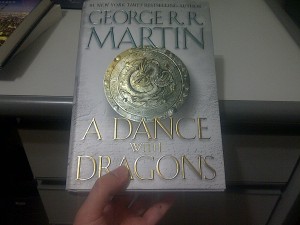The Children of the Sky, Vernor Vinge’s latest science-fiction novel, is the direct sequel to A Fire Upon the Deep (my review here). As such, I wouldn’t recommend starting the series with this book! That said, if you are familiar with Fire, I don’t think you need to re-read it – I enjoyed Children despite having read Fire so long ago, I only remembered its general premise.
Whereas Fire took place on two levels – a galactic storyline ran in parallel to events on the world of the Tines, the book’s featured alien species – Children takes place solely amidst the latter. Its plot was interesting enough to keep me reading, but I have a couple of complaints. One, not only does the ending suffer from “middle book syndrome”, but the lack of resolution felt a bit strange to me in light of previous developments. If A, B, and C already happened, then surely <character>’s fate shouldn’t have been left open? Two, while Vinge normally writes effective villains – his future totalitarians in A Deepness in the Sky were far more chilling than lesser authors’ Space Nazis/Commies – he slips here. One villain in Children was so slimy, and in such a way, that it felt as though Vinge was trying too hard to manipulate the reader’s (my) emotions. (This character also represents something of a missed opportunity – had he been less black-and-white, I think that would have given one plotline a bit more heft.)
However, that one villain is the exception. Otherwise, Vinge’s characterisation and “micro”-level writing cement him in the top tier of space opera authors, and he particularly shines at depicting aliens. I could simply list what I like about his writing – clever concepts, lively dialogue, likeable aliens – but it would probably be more effective to point you to this excerpt from chapter one.
Notice how many things Vinge does right in that excerpt. He gives a clear sense of the characters’ personalities, right down to the doorman. He gives an especially clear sense of Tycoon’s personality, first through the environment Tycoon has created, then through others’ reactions, and finally through the introduction of Tycoon himself. He gives a good sense of the world, starting with the contrast between servants/merchants/royalty and the word “factory district”, and he gives a great sense of how humans might look through another species’ eyes. All that just from the first two and a half thousand words!
Of course, Vinge doesn’t fire on all cylinders for every page; that excerpt is probably one of the better scenes. But even if the book as a whole is probably “decent” or “good” rather than “great”, its best sequences are sheer delight. That delight is what I remember when I look back on The Children of the Sky, and that delight is what makes me recommend it, despite my complaints, to series fans.
You can buy The Children of the Sky from Amazon US here.









